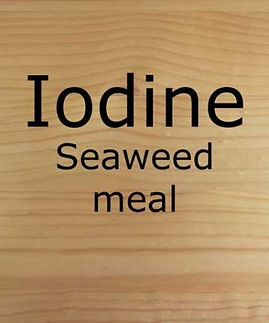


Kelp for Horses and Dogs – Why is Seaweed Good for Them
Which Kelp
It is important to understand that not just any kelp supplement from any type of seaweed is good for an animal supplement. Most are too high in iodine and that would quickly reach a toxic level. Ascophyllum nodosum seaweed from the cold North Atlantic has been used for centuries as a natural source feed supplement, low in iodine and rich in vitamins minerals and amino acids.
For thousands of years the Chinese have used kelp in their food and medicines and for agricultural purposes. Investigations into the use of seaweed for animal supplementation were commenced in France following the First World War when fodder was limited. The results of these studies were positive and continued until an industry developed to provide seaweed meal to livestock. Nowadays it is processed using controlled geothermal heat. This allows the seaweed to keep its enzyme potency intact, and keep it a biologically active product with high levels of nutrients. When used on a regular basis, kelp can improve the nutritional wellbeing of your animal.
Why is Kelp Effective for Horses
It is composed of 60 elements, 16 amino acids and 12 vitamins. As well as the combination of these nutrients the content of Algin provides an anti oxidant effect, it attracts heavy metals and removes them from the body. The availability of Carotene, Tocopherol and Folic Acid is useful. It also induces a high level of cytokinin type activity. Cytokinins are involved in cell division and as such growth and replacement of cells.
It has been shown to improve thyroid stimulation and also has antibacterial and anti-inflammatory benefits.
It is a very economical way to provide for most of the nutrients a horse that is not in hard work or coping with the demands of breeding. Those horses will need a more developed formula of macro and trace minerals like Vetpro Performance Minerals.
The Negative of Incorrect Kelp
There are other kelps that can be used for liquid fertilisers and have been used for supplements. Other kelp than Ascophyllum nodosum may have high levels of iodine so it is very important to know which kelp is being used. A horse has a daily requirement of approximately 3 mg per day, however it can tolerate up to 50 mg before it has serious negative effects on their health. Some liquid Kelp supplements provide 120 mg is a dose – so it is very important to check the labels of any supplement containing kelp, or enquire as to how much iodine is provided in each recommended dose. Goitre is one of the main problems of overfeeding iodine.
Kelp for Dogs
There is an increase in the use of green feeds for dogs, part of the move towards natural diets. Again it is important to make sure the kelp source is from the correct low iodine seaweed. Researcher Martin Zucker author of The Veterinarians Guide to Natural Remedies for Dogs, has included the benefits of kelp in a dog’s diet. He puts forward that it is useful against cancer, heart disease, mange, old age problems, and thyroid gland regulation.
As with horses, the alginates will assist in preventing the absorption of toxic metals like mercury and cadmium. The full range of nutrients are beneficial for dogs, kelp has an advantage over other green feeds as it does not have cellulose encircling the cell wall, cellulose can be difficult for a dog to digest. Of particular advantage to dogs is the effect of not just coat colour enhancement, but very helpful for dogs with skin allergies and alopecia. It may take several weeks but improvement in skin dryness and itchiness have been recorded. As it helps to improve metabolism the energy level is increased and resistance to disease and assisting immune functions are other benefits.





